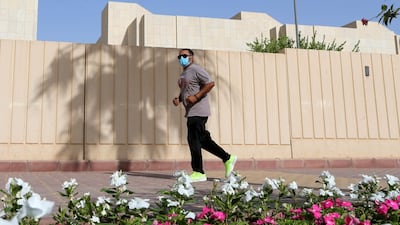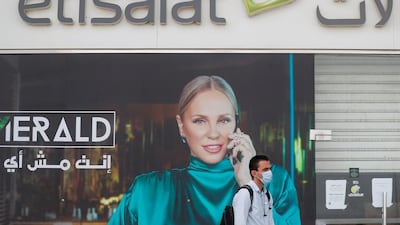The chairman of DP World, the largest operator of ports globally, is open to acquisitions, believes the UAE will come out of the Covid-19 pandemic stronger and is unfazed by the impact of the crisis, as the company leverages technology to serve businesses in the new environment.
"This crisis is not like the 2008-2009 [global financial] crisis. This is different," Sultan bin Sulayem said in an interview with The National.
“This is similar to the collapse of the world economies after World War II … there was a war, cities were damaged, factories were damaged, roads were destroyed … today we have a similar situation. Factories are not destroyed but workers cannot work in them. Streets are safe and clean, but no one wants to go [out]. People are not buying.”
The coronavirus pandemic, the most serious challenge to the global economy since the Great Depression, forced China, the world’s second largest economy, to go into lockdown and shutter all manufacturing, disrupting supply chains. Factories in the country have slowly come back online as the number of infections and deaths in the country receded.
The disruption and concerns over Covid-19 forced businesses and individuals to increasingly transact digitally, which DP World is capitalising on with its investment in technology.
“As far as DP World, we have definitely adapted ourselves to the situation. We have devised a role where we are a conduit to get food and medicine in and out very efficiently,” Mr bin Sulayem said.
“We are fortunate in the UAE that we adopted digital technology 20 years ago. The opportunity in this crisis is that in the past people used technology because it is easier, but they were not obliged to. Now it is a necessity, you need to use it. Everybody is buying whatever they need online,” he added.
To facilitate trade across DP World's global network of ports, terminals and economic zones in over 50 countries, the ports operator rolled out three digital platforms it already had in the pipeline, accelerating their push out because of the crisis. They cover sea, land and air shipping worldwide. DP World also created a Digital Freight Alliance, an online association, that gathers freight forwarders on to one platform.
The port operator may top up its investment in the digital space, Mr bin Sulayem said.
“Whatever it takes to take advantage of the opportunities … we have no limit,” he said. “We are actually saving money by not putting it in something else and putting it into this. The advantage for DP World is that since 2016, we invested in the region of $6 billion (Dh22bn) in logistics, logistics parks … all the assets that we built can be leveraged efficiently by technology.”
The pandemic has disrupted daily life, paralysed air travel, wiped out at least trillions of dollars from stock markets worldwide and forced governments to introduce economic stimulus packages worth more than $8 trillion as countries went into lockdown and economies came to a standstill.
DP World handled 17.2 million TEU (twenty-foot equivalent units) shipping containers across its global portfolio in the first quarter, with gross container volumes decreasing 1.7 per cent year-on-year on a reported basis but up 0.3 per cent on a like-for-like basis.
At its flagship Jebel Ali port in Dubai, it handled 3.4 million TEUs in the first quarter, down 3.4 per cent year-on-year, due to a decline in lower-margin cargo. But that’s of no concern to Mr bin Sulayem.
“This is not because of Covid, it’s because we are avoiding low margin cargo; cargo that doesn’t give me money – I don’t want it – I want cargo that gives me money,” he said.

Global trade is expected to decline 27 per cent in the second quarter of 2020, after falling 3 per cent in the first three months of the year, as global production and manufacturing output drop 9 per cent year-on-year, due to the pandemic, according to the United Nations Conference on Trade and Development.
At the start of the year, the price of a 20ft standard container stood at about $1,750, which increased to as much as $2,150 at the end of February, before falling to $1,900 in late March amid Covid-19 and the lockdown in China, according to industry consultant Drewry.
“Even though the Covid-19 pandemic will result in a decline in the size of the container equipment fleet in 2020, newbuild prices and leasing rates are expected to firm. A strong recovery in trading volumes in 2021 will reinforce this situation,” Drewry said in a report last month.
Still, where there is a crisis Mr bin Sulayem sees opportunity and he doesn’t rule out further expansion globally be it in investments or acquisitions.
“Absolutely. We are very opportunistic in this environment,” he said, when asked if they would consider acquiring assets in the wake of the pandemic and economic downturn.
“Whenever there is an opportunity, we see that there are [potential] customers of course we will do it. We are customer driven and oriented company,” Mr bin Sulayem added. “Today I don’t have a port in the North Pole, tomorrow somebody tells me there is cargo and customers tell me bring cargo to the North Pole, you will see that I will invest in the North Pole.”
Mr bin Sulayem continues to be upbeat on Africa, considered by investors and strategists as one of the last frontiers of growth.
“We are always bullish about Africa. Africa is a big opportunity, you see our investment in Senegal, in Berbera, in Rwanda, Mali and Chad. We need to improve the logistics in that area because that’s a big opportunity,” he said.
He also sees opportunity in Latin America and DP World intends to leverage its investments in Peru and Chile accordingly. In Asia, Indonesia is a pocket of growth for the company as is India despite its slowing economy.
“Our outlook for 2020 is [that] it's challenging; the real impact, we haven’t seen it so far, maybe we will see it in the second quarter,” Mr bin Sulayem said.
“It might become normal we don’t know. Before Covid came everybody expected 2020 to be bad … and we took a provision in our business," he added. "We didn’t believe there would be growth, we believed it’s going to be flat. We took very cautious decisions in investment, we took cautious decisions in tightening our belt and making sure we only invest in something that’s going to bring revenue.”
The immediate winners post Covid-19 are the logistics companies, those facilitating online trade and companies affiliated with the health and medical industry, Mr bin Sulayem said. For the losers, which include hotels, those affiliated with the hospitality and travel sectors, “it will take them a longer time [to recover],” he said.
For Dubai and the UAE, the former chairman of Dubai World, said lessons were learnt during the 2008 global financial crisis that are today shaping the response to the crisis and will accelerate the economy's rebound once the pandemic subsides.
“The crisis of Covid is totally different than any other crisis. But the policies that the UAE follows in dealing with a crisis stay the same,” Mr bin Sulayem said.
“[In] 2009, everybody predicted Dubai is the name you see everywhere about the crisis. What did we do? We borrowed $20bn to bail out government companies so they survive and at the same time we invested, as the Government of Dubai, $100bn in the metro, the power plants [and] in the huge network of bridges and roads. Similar things were done by Abu Dhabi, huge investment in infrastructure,” he added.
“As a result, the UAE was the first to come out of the crisis stronger than everybody else. That experience in solving problems regardless of what they are is our biggest asset today, we believe we will come out standing on our feet and you can see it evident by the collaboration of all the stakeholders.”
Mr bin Sulayem commended the Central Bank of the UAE for its swift decision to roll out stimulus and various emirates for pushing out incentive and relief schemes to help businesses cope with the crisis.
“While everybody else is busy asking why did this crisis happen and pointing fingers, in the UAE we are doing something about that, we are not wasting our time,” he said, adding “Today like you have a kid [who] cuts their ankle and is bleeding, we stop the bleeding first and we can talk about the rest later on .”

















